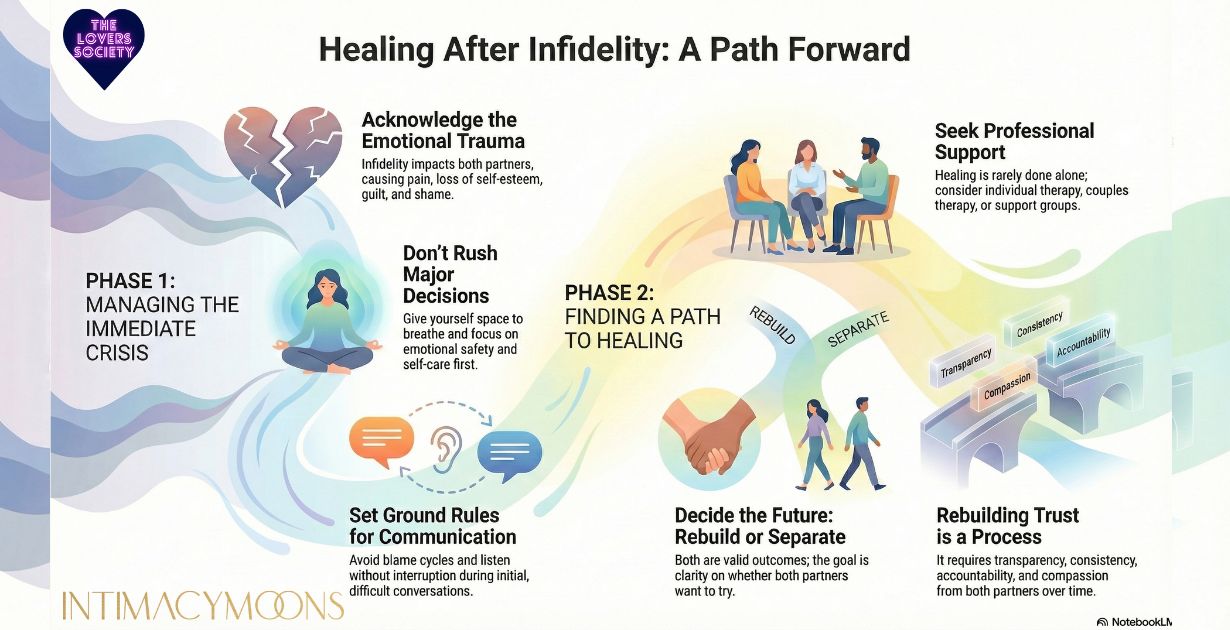- couples therapy retreats
- RETREAT THEMES
- PRIVATE PRACTICE
- THE LOVERS SOCIETY
- Blog
- Press


Finding out about an affair can feel like the world has been turned upside down. Suddenly, everything you thought you knew about your relationship feels uncertain. Shock, rage, grief, and confusion are common. You may wonder: “Can I ever trust them again?” or even, “Who am I in this relationship now?”
If you’re the partner who stepped outside the relationship, guilt, shame, and fear of losing everything can feel paralyzing. Both partners often experience deep pain—just in different ways.
The truth is, there’s no single “right” way forward after infidelity. But there are thoughtful steps you can take to protect your well-being and decide, with clarity, what comes next.
Infidelity isn’t just a breach of trust—it’s an emotional trauma. The betrayed partner may experience:
The partner who had the affair often experiences:
It’s important to recognize: both people are in pain. Healing begins with acknowledging the emotional reality of what’s happened.
When infidelity comes to light, emotions are high. Rushing to make big decisions can often lead to regret later. Instead, consider these first steps:
These steps help stabilize the emotional storm so you can think more clearly.
Talking about an affair is painful and complex. Here are some guidelines to help:
If emotions feel too overwhelming, bringing in a therapist can provide structure and safety for these conversations.
Healing from infidelity is not something most couples can—or should—navigate alone. Support options include:
👉 Explore our Private Couples Therapy Retreats if you’re looking for a guided, supportive space to start this work.
Healing after infidelity doesn’t mean automatically staying together. Some couples choose to rebuild; others decide to part ways. Both can be valid, healthy outcomes.
The first stage is about clarity: Do we both want to try? A retreat, therapy, or structured support can help couples slow down, process emotions, and explore whether there’s a shared desire to rebuild—or whether letting go is the best path.
If both partners commit to repairing the relationship, the process will take time and patience. Trust is rebuilt through:
Trust isn’t rebuilt overnight—but with steady effort, it can grow again.
Sometimes the bravest and healthiest step is to part ways. If you choose this path:
Ending doesn’t mean failure—it can mean honoring your truth and creating space for healing.
Infidelity changes a relationship forever, but it doesn’t erase the possibility of healing. Whether you and your partner decide to stay together or move on separately, you don’t have to navigate this alone. With the right support, clarity, and compassion, couples can move through the pain of betrayal and discover what comes next.
Infidelity is not a topic you necessarily want to wade through alone. Under these circumstances, consider going a couples therapy retreat with an instructor that specializes in dealing breaches of integrity. A couples therapy retreat can provide you with the sustained intervention needed to gain clarity and reset the foundations of healthy communication in your relationship. Consider reviewing our Ultimate Guide to Couples Therapy Retreats as well as the Best Sex Therapy Retreats in the US 2026. We also have developed guides on What Questions to Ask During a Couples Therapy Retreat Consultation, which can help you get past the awkwardness of vetting the Therapist and get closer to getting the support the you need.
Post-Affair Recovery
infidelity recovery, what to do after affair, rebuilding trust, betrayal in marriage
Back to Blog
